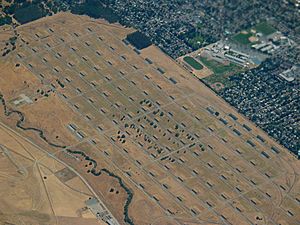Concord Naval Weapons Station facts for kids
Quick facts for kids Concord Naval Weapons Station |
|
|---|---|
| Concord, California | |

Aerial view taken in 2006
|
|
| Type | Military base |
| Site information | |
| Controlled by | United States Navy |
| Site history | |
| Built | 1942 |
| Events | Port Chicago disaster |
The Concord Naval Weapons Station was a large military base. It was built in 1942 north of Concord, California. This base was located near the Sacramento River and Suisun Bay. During World War II, it was a key place for storing weapons. It helped supply ships at Port Chicago.
The station also had a small airfield during World War II. This airfield stopped operating after the war. Later, during the Korean War, the Vietnam War, and the Gulf War, the station was very busy. It shipped huge amounts of military supplies across the Pacific Ocean.
The base had two main parts. The Inland Area was about 5,028 acres (2,035 hectares). It was located inside Concord city limits. The Tidal Area was much larger, about 7,630 acres (3,088 hectares). Over time, military needs changed. Parts of the Inland Area were slowly closed down. By 1999, only a few military staff remained. Most of the buildings, like ammunition bunkers and warehouses, were empty. In 2007, the U.S. government decided to close the Inland Area completely. The Tidal Area of the base remained open.
The City of Concord is now planning what to do with the Inland Area. They want to build homes and businesses there. However, about two-thirds of the land will become open space and parks. The East Bay Regional Park District will get 2,540 acres (1,028 hectares). This land will become a public park called Concord Hills Regional Park.
Contents
Port Chicago Disaster: A Tragic Event
In 1944, a terrible accident happened at Port Chicago. Thousands of tons of ammunition were being loaded onto a Navy cargo ship. Suddenly, the ship exploded. This explosion instantly killed 320 people. These included sailors, merchant seamen, and civilians. It was the largest loss of life for African American service members in one event during World War II.
The huge blast was felt up to 30 miles away. After this disaster, 258 black sailors refused to load more ammunition. This led to a large mutiny trial in the Navy. Fifty men were found guilty. Thurgood Marshall, who later became a Supreme Court Justice, watched the trial. He said the court seemed unfair.
War Protests: Speaking Out for Peace
In the 1980s, the Concord Naval Weapons Station became a site for protests. People were against the U.S. sending weapons to Central America. Protesters gathered daily outside the base. They wanted to stop the shipments.
On September 1, 1987, a peace activist named Brian Willson was badly injured. He was a U.S. Air Force veteran. He sat on the railroad tracks to try and stop a Navy munitions train. The train ran over him. He suffered a fractured skull and lost both his legs below the knee. This incident was not prosecuted in criminal court. However, a civil lawsuit was filed, and a settlement was reached.
After Willson's injury, thousands more joined the protests. Famous people like Jesse Jackson and Joan Baez also participated. During one protest, anti-war activists removed parts of the Navy railroad tracks outside the base. Police and U.S. Marines watched but did not stop them.
Superfund Site: Cleaning Up the Environment
The Concord Naval Weapons Station was named a Superfund cleanup site in 1994. This means the area had been contaminated. Experts found 32 spots on the base with harmful substances. These included heavy metals like zinc, copper, lead, cadmium, and arsenic. Other chemicals, like semi-volatile organic compounds and pesticides, were also found.
One big concern was the risk to endangered animals. These included the salt marsh harvest mouse and the California clapper rail. Environmental cleanup work is ongoing at the base. In some areas, contaminated soil is removed. In other areas, the ground is covered to stop the spread of harmful materials.
Current Operations: A New Purpose
In 2008, control of the base changed. The Inland Area became a smaller part of the Naval Weapons Station Seal Beach. It is waiting for its final closure. The Tidal Area was given to the U.S. Army. It is now called Military Ocean Terminal Concord (MOTCO). This facility is also used by the Diablo Squadron and Training Ship Concord of the United States Naval Sea Cadet Corps.
GoMentum Station: Testing Self-Driving Cars
In October 2014, a part of the Concord Naval Weapons Station got a new use. It became a testing ground for self-driving cars. This area is called GoMentum Station. The Intelligent Transportation Society of America announced this new purpose.
The test site is very large, with 2,100 acres (850 hectares) and 19.6 miles (31.5 km) of paved roads. It is the biggest secure test site for self-driving cars in the United States. The public cannot enter the test site. The self-driving cars must stay within the testing area. Companies like Mercedes-Benz have licenses to test new driving technology there. This includes smart traffic signals that can talk to cars.
Community Concerns: A Proposal for the Site
In 2018, there was news about a plan for the former base. The Navy considered building temporary housing on the site. This proposal was met with strong opposition from the community. The mayor of Concord spoke out against it. He said the Superfund site was "not suitable for public habitation." Congressman Mark DeSaulnier also called the idea "madness." A few days later, the Congressman confirmed that the proposed housing would not be built.
 | Jessica Watkins |
 | Robert Henry Lawrence Jr. |
 | Mae Jemison |
 | Sian Proctor |
 | Guion Bluford |

